I want drawing to be part of my life
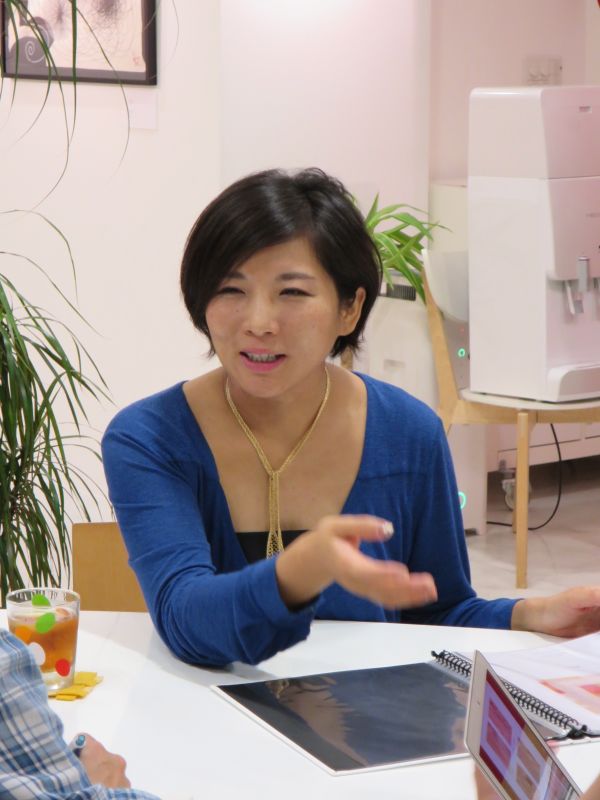
I want drawing to be part of my life
As an adult you don't often get the chance to draw. I've always loved drawing pictures and I wanted it to be a part of my life, so for a number of years I'd been participating in the New Year's EGAKU session once a year.
Every time I took part I'd discover something new about myself and that fascinated me. The EGAKU Program is a pretty compact program, and I felt it was an effective way to integrate this creative practice into my life. It was also at a time in my life where I'd started a new role at work, and I felt the need to step back and take stock of where I was and engage in introspection.
Confronting 'sorrow' the first time, I realized it was an important emotion for me
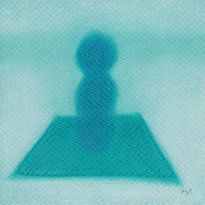
Confronting 'sorrow' the first time, I realized it was an important emotion for me
Drawing a picture on the theme of 'sorrow' was the first time in my life I really confronted the emotion of 'sorrow.' By giving expression to my belief that I can't feel positive without an element of sorrow, I realized that sorrow is actually an important emotion for me. I was surprised by what I ended up drawing.
'Anger' was a challenging theme as it's a negative emotion - an emotion I dislike and try to avoid. So it was amusing to get so many cheerful, upbeat comments about my picture from the other program participants. I'm not the kind of person who has angry outbursts so perhaps that's something people picked up on through my picture.
Exploring the inherent contradictions in the themes and finding 'balance'
The idea of 'balance' is important for me, and this always comes across in my pictures.
Life is a mass of contradictions and so it's all about how you approach it, how you enjoy it and how you find your balance. When I'm drawing a picture, whatever the theme, it's an opportunity to explore these contradictions and find my own balance. It's interesting how this sense of 'balance' always shows up in my pictures.
In EGAKU you're faced with a question, a theme to respond to in a short period of time. You have to draw a picture within the confines of a 15cm square canvas in a limited time frame so it really makes you focus. It gives you the chance to play around with these contradictions within these boundaries.
Me, my picture, the theme: falling into synch
One thing I've noticed as I continue the practice of EGAKU is how I've become synchronized with the picture and theme. At the beginning of the course depending on the theme, I'd find myself getting anxious and finding excuses for not engaging with the theme and holding back. I found couldn't draw the way I wanted to. Over time as I repeated the experience, I began to feel more at ease and I felt that the theme, myself and this act of drawing were becoming synchronized.
The other participants in the EGAKU sessions are all amazing and there's a healthy degree of tension. At the beginning I'd be holding my breath as I drew, but eventually I found I could relax and breathe more easily. Over time I found I could handle any theme and that I could connect it to something that I was interested in. I started thinking it's ok to draw anything I want. What's more, however many times you draw a picture, it's different every time. The possibilities are infinite.
The other participants give me a lot of courage
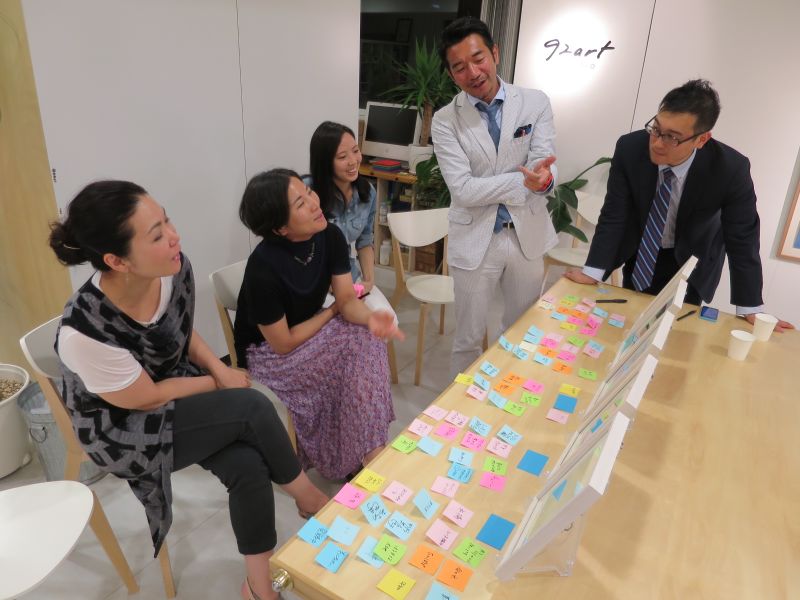
The other participants give me a lot of courage
The feedback I got from other participants give me a lot of courage. Even when I came up with something that was totally unexpected, people would remark how it's so me and that they like it. It made me think, "Oh - so it's really ok to draw whatever I want." In the beginning I thought I had to take a cerebral approach to drawing, but then I realized that when I did that I'd get a pretty dry reaction, whereas I'd get an incredible response when I decided to just take the plunge. When you see that whatever you come up with using your head isn't always the best answer, that it doesn't touch people's hearts, you see that the only way to get through to people is by showing them who you really are. And that it's actually more fun that way. I find it really hard to open up to other people, but the other participants gave me the courage to open myself up little by little.
Lessons in decision-making and the art of elimination
When I started the TOTSUKITOKA course, there were so many things I wanted to do and I was struggling to fit everything in. I was highly motivated but was struggling to find the right balance in my life, I was cutting down on my sleep, feeling tired and worn. Doing TOTSUKITOKA helped me figure out my priorities.
In the EGAKU Program all you have is this 15cm space to express your thoughts. So it means that you have to leave out a lot of things including many ideas that you had at the outset. Even if you have all these ideas, you can't fit everything in. Through the 10 sessions, I learned to see this process of elimination as something positive and I began to understand that eliminating can even make some things better.
I feel I've become better at making decisions in my life generally. I don't feel so guilty about eliminating things from my life - that's something I didn't expect to walk away with from the course.
Creating new habits of thought and seeing the whole picture
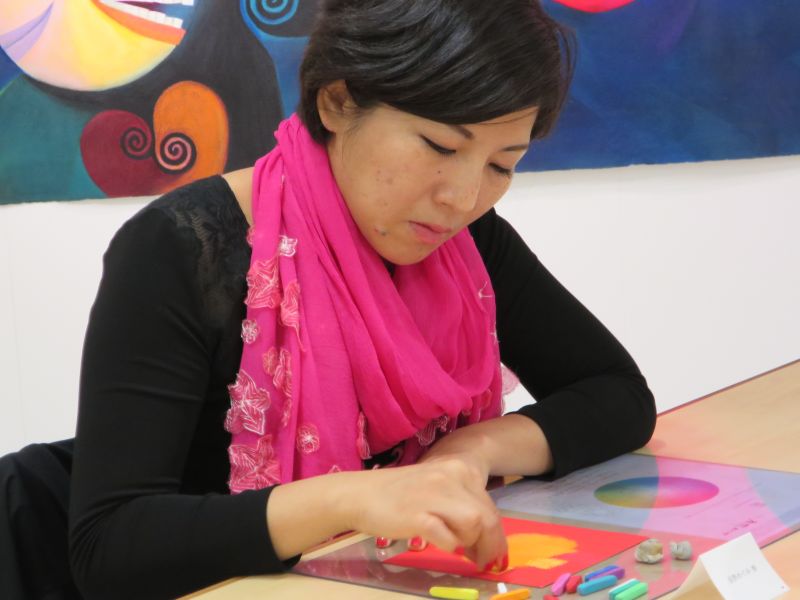
Creating new habits of thought and seeing the whole picture
It's a fascinating process - choosing the colors on the worksheet and then re-imagining these colors in words, it gives you a different way of approaching something. When things aren't going according to plan, I think of that worksheet and say to myself, "Ok let's try thinking in colors." I feel like I have one more tool in my toolkit.
If things aren't working, I think "Let's try something different." When I get stuck, I can now step back and tell myself that this isn't the only approach. I'm aware of other possibilities, other approaches or interpretations, its become part of the way I approach the world. These days I find that this way of thinking comes to me naturally without too much effort.
Diversity and nurturing the capacity for empathy
There's something else I realized about diversity through EGAKU.
It amazes me to see how people responding to the same theme, in the same space and time, can come up with such different pictures. At work, even if we think we're on the same page with other people, there's the real possibility that there are misunderstandings all over the place. I believe many things in the world are based on misunderstandings and I see the beauty in that. But I think seeing how drawing pictures using the same materials produces such wildly different outcomes, has taught me how to remain serene in any situation I find myself in. Every time I attend EGAKU and experience diversity as a lived experience, it affects me more than I expect.
When you spend a lot of time with people at work, there's a tendency to converge on a shared understanding, but these days I find I can handle situations without relying on these shared understandings. Perhaps I've become a more empathetic person.
We are all artists
In EGAKU I always marvel at how such creative works emerge from this limited space and time. I work in marketing and I find that if you're given total freedom, it's actually hard to be creative. Creativity emerges by working within limitations. I think the EGAKU Program is an example of how the creative process works.
Outside work I'm involved in an art project which takes the idea that fermentation is art created by microorganisms. I haven't graduated from art school and I've never formally studied art, so I always thought I didn't have permission to give expression to my creativity, to share it with the world.
But through TOTSUKITOKA I realized that there's an artist in all of us. It gave me the courage to believe that anyone - including myself - can draw a picture. It gave me the courage to put myself out there, after all I have nothing to lose.
An exercise in building the confidence to be myself
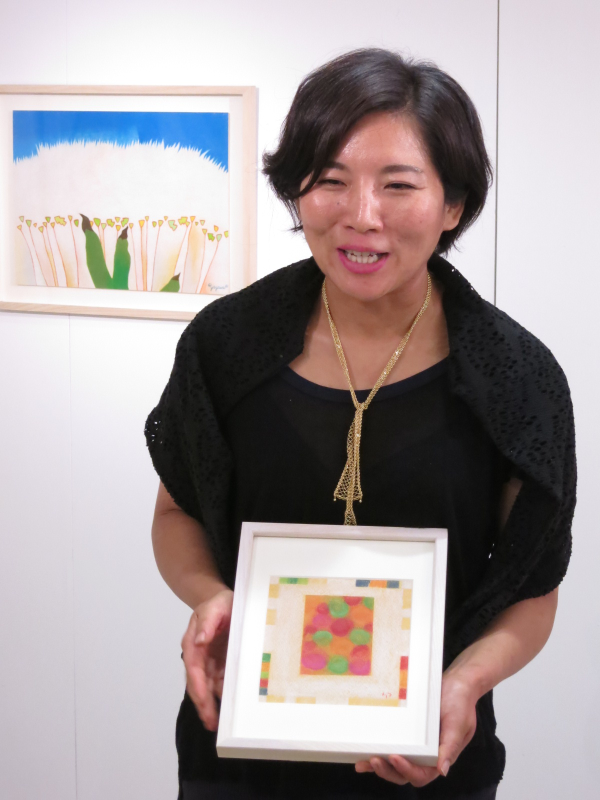
An exercise in building the confidence to be myself
I've always wanted to be true to myself, to have the confidence to be myself. I feel I'm at a stage in life where I'm almost there. In my early 30s, there was a massive gap between my ambitions and reality and I couldn't bring myself to accept who I was. It was a stressful place to be. I was anxious, and trying hard to look good, to prove myself. There was a constant internal struggle. All the time I was hoping that one day I'd be more accepting of who I was, that I'd be more positive about myself.
I'm thankful that I experienced TOTSUKITOKA just as I was entering my late 30s, a point in my life where I'd become more comfortable with being honest with myself. I'm slowly learning to be more honest with myself. TOTSUKITOKA helped me build the confidence to be myself.
*This article is a translation of the original Japanese interview.